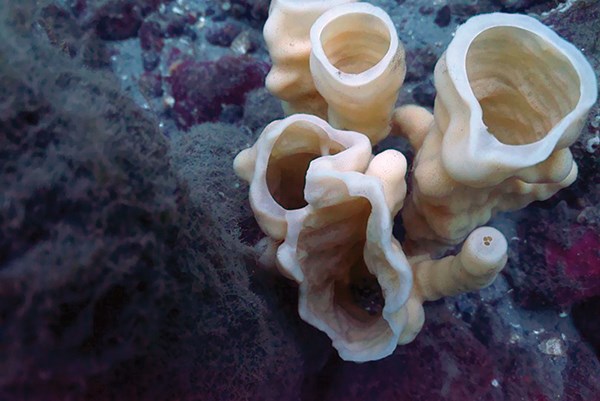About 30 metres below the surface of Howe Sound live glass sponge reefs that were believed to have been extinct for 65 million years.
ŌĆ£WeŌĆÖve always known the sponges still existed, that the sponges didnŌĆÖt go extinct, but they were not building reefs,ŌĆØ said Jeff Marliave, senior scientist and head of the Howe Sound research program at the Vancouver Aquarium.┬Ā
HeŌĆÖs been studying glass sponge reefs in Howe Sound since 2009.┬Ā
The sponges look like misshapen vases formed into a bouquet crafted by children. They can range from off-white or a burnt orange colour.
Glass sponges, unlike most animals and plants, are made of silica molecules rather than carbon.┬Ā
ŌĆ£They are called glass sponges because their bodies are made up of spicules of silica, they are sharp little glass spicules,ŌĆØ Marliave said, adding cloud and boot sponges are types of glass sponges found in the sound.
Many people donŌĆÖt know glass sponges are found here, he said.
Howe Sound is the only place in the world known to have glass sponge reefs accessible to sport divers, according to Marliave.
Reefs are found in several locations in Howe Sound: near the Defence Islands, between Christie Islet and Pam Rocks just south of Anvil Island, in Halkett Bay and just south of Snug Cove and southwest of Passage Island.┬Ā
ŌĆ£ItŌĆÖs wicked that it is in our territory,ŌĆØ said experienced scuba diver Nathan Lewis, a member of the ┬ķČ╣╔ń╣·▓·Nation. Lewis went down to see some sponge reefs with Marliave.┬Ā
┬ĀŌĆ£I wasnŌĆÖt expecting to see the amount of sea life in and around the coral,ŌĆØ he said. ŌĆ£It caught me by surprise and it was really beautiful. You have small fish that actually live right inside the coral, like shrimp.ŌĆØ┬Ā
Marliave said some divers have known about the glass sponge reefs in Howe Sound for years but kept their knowledge quiet for fear of people damaging the find.┬Ā
ŌĆ£But we have made a decision amongst the sport dive industry that we have to call attention,ŌĆØ he said, ŌĆ£Because if people donŌĆÖt know they exist, who is going to care enough to see them protected?ŌĆØ┬Ā
MarliaveŌĆÖs research looks at how the glass sponges may be immortal.
ŌĆ£It appears to me that the basis of the sponge on the reef is not through sexual reproduction,ŌĆØ he said.┬Ā
ŌĆ£Sponges can do that, yeah, that is how they get on rockfaces and all, but fragments can also re-grow.ŌĆØ┬Ā
ŌĆ£So in fact, the top of the reef bounces back and crashes, bounces back and crashes, which is how it sort of recovers from minor bits of damage from fishing activity and such.ŌĆØ┬Ā
Marliave is publishing a paper about his research this year.┬Ā
The problem with the sponges is they can be easily damaged by the fishing industry, including by prawn fishers, he said. ŌĆ£The cloud sponge has the mechanical characteristics of a meringue fresh out of the oven. They shatter very easily,ŌĆØ he said.
In a strong current, they are fairly plastic, he said, but ŌĆ£if you swack them with a fishing line or a swim fin or a prawn trapŌĆ” they are crushed.ŌĆØ┬Ā
Last summer, the Department of Fisheries and Oceans implemented fishing closures to protect nine glass sponge reefs in the Strait of Georgia and Howe Sound, but Marliave would like to see expanded and permanent closure of these areas in order to prevent destruction of the reefs.
The reefs in Howe Sound are in fairly good shape, he said, and he wants to see them stay that way.
Lewis said when he saw the sponges, he thought about the importance of protecting Howe Sound.┬Ā
ŌĆ£In the same breath, I have also seen the pollution that pollutes our sound, which is tragic.ŌĆØ




